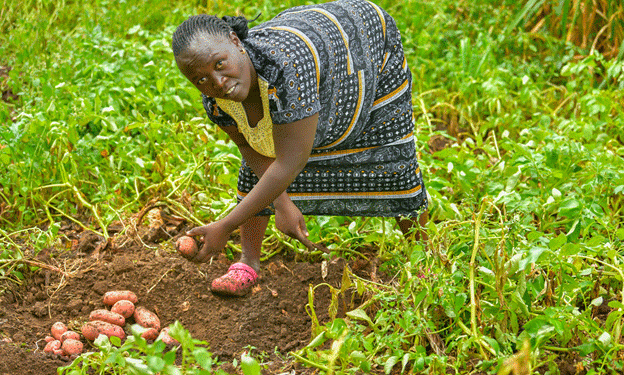In the arid landscapes of Kenya’s Laikipia County, farmers are witnessing a breakthrough in potato cultivation thanks to the Unika potato variety. Bred by the University of Ica in Peru in the 1990s, Unika was designed to withstand extreme weather and combat food security challenges. Now, Unika is thriving in Kenya, where its drought resistance and high yields have made it the focal point of a joint project led by the Food and Agriculture Organization (FAO) and UN Women. With funding from the Korean International Cooperation Agency (KOICA), the project “Promoting Women’s Economic Empowerment through Climate-Resilient Agriculture” (PWEE-CRA) seeks to equip female farmers with sustainable, high-yield crops like Unika to improve food security in climate-stricken areas.
Esther Murugi, a Laikipia farmer participating in this project, has transformed her farm’s productivity. She cultivates half an acre of Unika potatoes, which, even in drought conditions, produce a harvest in just three months. Not only has this improved her family’s food security, but it has also allowed her to maintain a potato surplus. As she states, “Before we began growing Unika, potato yields were decreasing, regardless of our efforts. Now, just look at the results.”
For Laikipia farmers, potatoes are a primary food and income source. However, the region’s semi-arid climate and limited rainy season restrict cultivation options. Many local farmers have struggled with low-quality seeds that succumb to diseases like late blight, a common problem in areas with poor seed quality and high pest presence. These challenges have been exacerbated by worsening drought conditions, underscoring the need for innovative agricultural solutions.
Climate-Resilient Agriculture: How the Project Works
The PWEE-CRA initiative began in 2020, targeting three Kenyan counties: Laikipia, Kitui, and West Pokot. Alongside Unika, the project introduced climate-adaptive practices and knowledge-sharing programs for women farmers, who are often central to household food production but face greater resource and skill gaps.
Unika was specifically chosen due to its robust resilience traits: it can thrive in both high and low altitudes, endure high temperatures, and requires minimal water. Unika’s resistance to diseases like late blight is another asset, as many local varieties fall prey to this and other pathogens. According to project leader Barrack Okoba, “Our choice of Unika aligns with local farmers’ needs, environmental conditions, and the project’s goals of empowering climate-resilient agriculture. The results have been remarkable.”
Education for Lasting Impact
The project doesn’t stop at providing seeds. PWEE-CRA equips farmers like Esther with essential training on Unika’s cultivation techniques, including post-harvest handling and finding market outlets. A member of the Ng’eni Disabled Self-Help Group, Esther is part of a community-oriented approach that targets farmers with limited resources, including those with disabilities, who often have restricted access to training.
Esther’s group learned a new propagation method through the project: cutting potato tubers’ apical parts for quality seed stock. This method yields more robust potatoes, and Esther shared, “We had grown potatoes for years, but we had never tried apical cutting. It has boosted our yield, and now we have enough potatoes to last through each season.”
The training also enabled Esther to eliminate chemical treatments for late blight, as Unika’s natural resistance made these treatments unnecessary. Financial literacy sessions provided through the project helped her group increase their savings to 500,000 Kenyan shillings ($4,000) in a village savings scheme, giving them a reliable safety net.
New Economic Opportunities
Unika’s high yields have opened new revenue streams for local farmers. Esther’s group has begun producing value-added products like potato chips, “bhajias” (potato fritters), and French fries, which they package and sell at local markets for additional income. They plan to expand their market reach to nearby cities, anticipating even more growth in the coming years.
At the closing exhibition of the PWEE-CRA project, Esther’s group connected with a local potato-processing company associated with the Kenya Potato Council. This partnership paves the way for increased collaboration between women potato farmers and processing companies, facilitating broader market access and sustainable income sources for local farmers.
The Unika potato project demonstrates the profound impact of climate-resilient agricultural practices on food security and economic empowerment in regions affected by extreme weather. By introducing Unika alongside specialized training, the PWEE-CRA project has equipped Kenyan farmers with the tools they need to overcome climate challenges, ensuring reliable food supplies and creating economic opportunities. As farmers like Esther continue to succeed, Unika has become more than just a crop—it’s a symbol of resilience and sustainable agriculture for Kenya’s rural communities.







